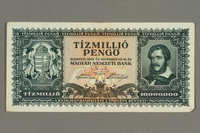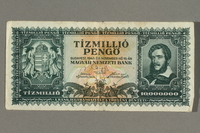Overview
- Collection Summary
- The 3 reels of 8mm film in the Vogel collection portray life in pre-war Hungary, as shot by Steven Vogel, a Jewish survivor of the Holocaust. Most scenes document the recreational activities of the Vogel and Brust families, including visits to the community pool, family meals, and a trip to Paris. Much of the focus is on young Eva Brust as she enjoys her time with family, friends, and her governess in Budapest.
Administrative Notes
- Legal Status
- Permanent Collection
- Film Source
- Dr. James Vogel
- Special Collection
-
Steven Spielberg Film and Video Archive
Browse 4 Items In This Collection
Jewish family life before the war in Budapest
Film | Accession Number: 2002.175.4 | RG Number: RG-60.1819 | Film ID: 4162
Vogel family swims and ice skates before the Holocaust in Hungary
Film | Accession Number: 2002.175.4 | RG Number: RG-60.1820 | Film ID: 4163
Swimming; family takes a train in June 1940
Film | Accession Number: 2002.175.4 | RG Number: RG-60.1821 | Film ID: 4164
Jewish family visits Paris
Film | Accession Number: 2002.175.4 | RG Number: RG-60.1822 | Film ID: 4164
- Record last modified:
- 2022-07-28 18:30:51
- This page:
- https://collections.ushmm.org/search/catalog/irn553820
Download & Licensing
Contact Us
Also in Steven Vogel collection
The collection consists of a cotton shirt and a leather belt worn by Steven Vogel as he exited Mauthausen concentration camp upon liberation in April 1945. Steven Vogel took the shirt and belt from an SS storeroom housing clothing and supplies at the camp. Letter: handwritten by Tomi Baratod [sic] in Budapest addressed to "Pistka" [sic], dated December 14, 1946. Letter describes events in Auschwitz concentration camp in Poland after Steven was evacuated from there to Mauthausen concentration camp in Austria. Written by a friend of Steven's who remained in Auschwitz and detailed his experiences, in Hungarian. Film reel: 3 reels of 8mm pre-war Hungarian family footage.
Date: approximately 1945
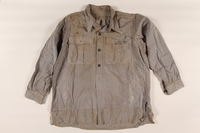
Shirt taken from an SS storeroom at a concentration camp by a Hungarian Jewish inmate and worn after liberation
Object
Men’s long-sleeved shirt taken from an SS storeroom at Mauthausen concentration camp in Austria, by Steven (István) Vogel and worn for two days after liberation on May 5, 1945. Steven, an only child, grew up in Budapest, Hungary, with his parents Edmond and Vilma. In September 1939, during Steven’s last year of high school, Germany began World War II by invading Poland. In November 1940, Hungary officially joined the Axis alliance and began fighting alongside Germany. Initially, the alliance had little impact on Steven’s life, and he began law school in 1941. In February 1944, his father, Edmond, passed away due to kidney disease. On March 19, German forces occupied Hungary because the nation had tried to negotiate an armistice with the Allies. Steven and his mother were arrested on May 23, and taken to Gestapo headquarters. Steven and Vilma were deported to Auschwitz-Birkenau killing center in German-occupied Poland. Upon their arrival, Vilma was sent to the gas chambers and murdered. Steven was initially selected for forced labor at a coal mine, and then later at a Volkswagen factory. In April 1945, as the Red Army advanced on the region, the factory complex was evacuated. Steven was sent on a forced march through the snow and ice for several days before being put on a train to Mauthausen. Shortly after his arrival, the camp was liberated by American troops. After liberation Steven made his way to Switzerland, before immigrating to the United States on November 3, 1945.
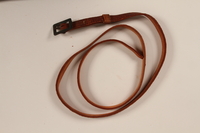
Leather belt taken from an SS storeroom at a concentration camp and worn by a Hungarian Jewish inmate after liberation
Object
Leather belt taken from an SS storeroom at Mauthausen concentration camp in Austria, by Steven (István) Vogel and worn for two days after liberation on May 5, 1945. Steven, an only child, grew up in Budapest, Hungary, with his parents Edmond and Vilma. In September 1939, during Steven’s last year of high school, Germany began World War II by invading Poland. In November 1940, Hungary officially joined the Axis alliance and began fighting alongside Germany. Initially, the alliance had little impact on Steven’s life, and he began law school in 1941. In February 1944, his father, Edmond, passed away due to kidney disease. On March 19, German forces occupied Hungary because the nation had tried to negotiate an armistice with the Allies. Steven and his mother were arrested on May 23, and taken to Gestapo headquarters. Steven and Vilma were deported to Auschwitz-Birkenau killing center in German-occupied Poland. Upon their arrival, Vilma was sent to the gas chambers and murdered. Steven was initially selected for forced labor at a coal mine, and then later at a Volkswagen factory. In April 1945, as the Red Army advanced on the region, the factory complex was evacuated. Steven was sent on a forced march through the snow and ice for several days before being put on a train to Mauthausen. Shortly after his arrival, the camp was liberated by American troops. After liberation Steven made his way to Switzerland, before immigrating to the United States on November 3, 1945.
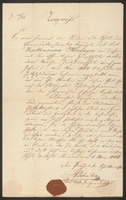
Steven Vogel papers
Document
The collection documents the Holocaust experiences of Steven Vogel of Budapest, Hungary including his deportations to the Auschwitz-Birkenau and Mauthausen concentration camps and his immigration to the United States in 1945. Included are pre-war identification documents of Steven, his parents Ödön and Vilma (née Deutsch) Vogel, and other relatives in the Vogel and Deutsch families; birth certificates; report cards; immigration paperwork; tax and selective service forms; family history; an oral history interview transcript; restitution claims; and correspondence. Included with the correspondence is a 1946 letter to Steven from Tomi Baratod describing their experiences at Auschwitz.

